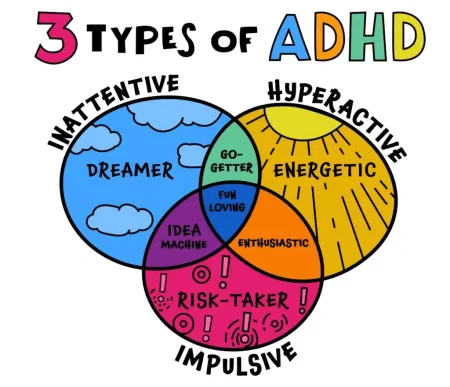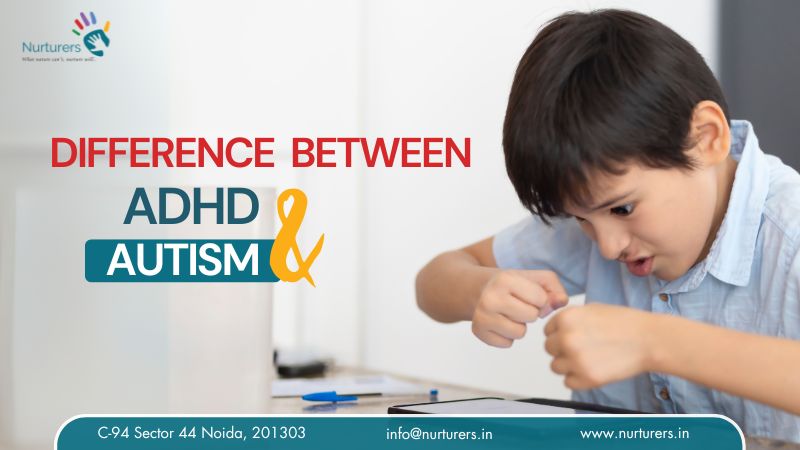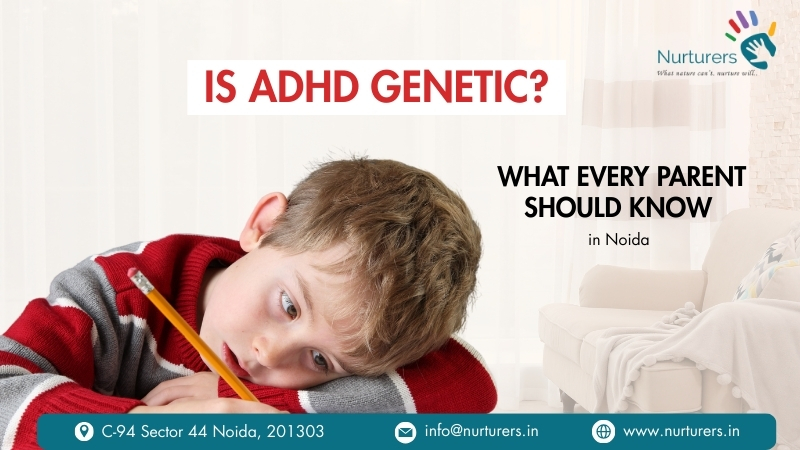Attention Deficit Hyperactivity Disorder (ADHD) is one of the most common neurodevelopmental conditions seen in children, often marked by inattention, impulsivity, and hyperactivity. Many parents wonder whether ADHD is caused by parenting styles, lifestyle, or something deeper like genetics. Research has shown that ADHD does have a strong genetic link, meaning it can run in families, but environmental factors and brain development also play an important role.
Understanding this balance between genes and environment helps parents move past guilt or misconceptions and focus on early support, therapies, and strategies that can truly make a difference in their child’s life. For families in Noida and beyond, recognizing the genetic aspect of ADHD is the first step toward seeking professional help, understanding the difference between ADHD and autism, and exploring the right interventions with the guidance of a specialist.
What is ADHD?
Attention-Deficit/Hyperactivity Disorder (ADHD) is one of the most common neurodevelopmental conditions in children, and it continues into adolescence and adulthood for many individuals. It affects how the brain manages attention, self-control, and energy regulation. Simply put, children with ADHD process information and respond to situations differently.
It’s very important for parents to understand that ADHD is not about being “lazy,” “careless,” or “undisciplined.” These children genuinely want to do well, but their brains struggle with focus, impulse control, and organization. With the right guidance, however, they can learn skills to succeed in academics, friendships, and everyday life.
Common Signs of ADHD in Children
- Difficulty paying attention to details or instructions: A child may listen when spoken to, but forget instructions almost immediately. For example, if you ask them to bring a pencil and notebook, they may only return with the pencil.
- Forgetfulness in daily tasks: Children with ADHD may often forget homework, school projects, or even their lunchbox. At home, they may leave toys scattered around or forget what you just asked them to do.
- Fidgeting, tapping, or difficulty sitting still: They may constantly move their hands, legs, or body, especially in situations where sitting still is expected—like classrooms, dining tables, or during prayers.
- Acting without thinking: Impulsivity is another hallmark sign. A child may blurt out answers before the question is completed, interrupt conversations, or grab toys from others without waiting for their turn.

Types of ADHD in Children
Clinicians generally classify ADHD into three main patterns, known as the Types of ADHD, each with distinct behaviors. Understanding the type your child exhibits is crucial because it determines which strategies and therapies will be most effective.
1. Inattentive Type
Children may be forgetful, easily distracted, daydream, or avoid long tasks. They often lose items like books or toys. Strategies: Break tasks into small steps, use checklists, and create quiet study spaces.
2. Hyperactive-Impulsive Type
Children are restless, fidgety, talk excessively, or act without thinking. Strategies: Provide movement breaks, structured routines, and calming exercises like deep breathing.
3. Combined Type
Displays both inattentive and hyperactive-impulsive behaviors. Strategies: Use a mix of attention-building and energy-regulation techniques, structured routines, and visual reminders.
Why it matters: Knowing the type helps tailor therapy, home routines, and school support for the child’s specific needs. At Nurturers, Noida, we assess the type carefully to provide personalized interventions.

Is ADHD Genetic?
Genetics play a major role in ADHD. Studies suggest that if a parent or sibling has ADHD, a child’s chances of having it increase by up to 70–80%. This shows a strong hereditary link. ADHD genes influence the way brain circuits handle dopamine and norepinephrine, chemicals that regulate attention and self-control.
However, genes are not the full story. Other contributing factors include:
- Prenatal conditions: exposure to smoking, alcohol, or stress during pregnancy.
- Birth factors: premature birth or low birth weight.
- Early environment: chronic stress, lack of sleep, or inconsistent routines.
- Diet and lifestyle: nutrition and daily structure can affect symptoms.
So, while ADHD is genetic, parents in Noida should remember that the right environment, therapy, and strategies can significantly improve outcomes.
ADHD and Autism—The Connection
Parents often confuse ADHD and autism because some of their symptoms look very similar. Both are neurodevelopmental conditions, meaning they affect how the brain grows and functions, but they don’t affect children in exactly the same way.
Children with ADHD typically struggle with attention, hyperactivity, and impulsivity, while children with autism often face challenges in social interaction, communication, and flexibility of behavior. However, because both conditions can involve difficulties with focus, emotional regulation, and behavior control, they can sometimes appear alike.
The Difference Between ADHD and Autism
Understanding the difference between ADHD and autism is essential for parents, caregivers, and educators, because it directly affects the type of support and therapy a child needs. While both are neurodevelopmental conditions and can sometimes overlap, their core challenges are different.
ADHD: Regulation and Impulse Control
Children with ADHD primarily struggle with attention, impulsivity, and hyperactivity. Some key traits include:
- Forgetfulness and distractibility: Children may start homework but forget to finish it, misplace belongings, or frequently switch from one activity to another.
- Hyperactivity: They may fidget, tap their feet, or get up constantly during activities that require sitting still, like classroom lessons or family meals.
- Impulsivity: They may blurt out answers, interrupt conversations, or act without thinking about consequences.
In daily life, ADHD challenges are often seen in regulation of behavior and focus rather than the ability to communicate or socially connect. With structured routines, behavioral strategies, and focused therapy, children with ADHD can improve attention, reduce impulsive actions, and manage energy levels effectively.
Autism: Connection and Social Interaction
Autism primarily affects social interaction, communication, and flexibility. Key traits include:
- Social differences: Children may avoid eye contact, have difficulty understanding social cues, or prefer solitary activities.
- Communication challenges: Some children may have delayed speech, trouble with back-and-forth conversations, or difficulty expressing emotions.
- Preference for routines: Changes in schedule, environment, or daily rituals can cause anxiety or meltdowns.
- Sensory sensitivities: Overreaction to sounds, textures, lights, or smells is common.
Unlike ADHD, the core issue in autism is about connection and understanding social and sensory experiences. Therapy often focuses on social skills, communication, sensory integration, and flexibility training.

Signs Parents Should Watch
At home, ADHD may look like:
- Messy rooms, lost belongings, or half-finished tasks.
- Meltdowns over small frustrations.
- Constant moving or climbing on furniture.
At school, ADHD may look like:
- Careless mistakes in homework.
- Trouble staying seated during class.
- Blurting out answers before the teacher finishes the question.
Early recognition allows early support, which is why families in Noida should not wait too long if these signs are persistent.

ADHD Diagnosis at Nurturers, Noida
Our process includes:
- Family history: checking if ADHD is genetic in the child’s case.
- Standardized questionnaires for both home and school.
- Observation-based assessments: checking attention span, impulse control, and activity levels.
- Medical collaboration: ruling out sleep issues, vision/hearing problems, or thyroid/iron deficiencies.
This whole-child approach ensures we don’t just label a child but truly understand their needs.
Effective Therapies and Interventions
At Nurturers, we use evidence-based therapies such as:
- Occupational Therapy (OT) – for self-regulation, sensory needs, and focus.
- Behavior Therapy – to encourage positive habits and reduce impulsivity.
- Parent Training – teaching parents how to set routines, use visual schedules, and reinforce positive behaviors.
- School Collaboration – supporting teachers with strategies like shorter tasks, movement breaks, and structured routines.
For some children, medication (under a doctor’s supervision) may complement therapy. But therapy and family support remain the foundation.
ADHD and Autism Together
When both conditions exist, therapy includes:
- Social skills training (turn-taking, conversations).
- Emotional regulation strategies.
- Attention-building activities combined with communication therapy.
Parents often find that when both areas are addressed together, daily life at home and school becomes smoother.

Finding the Right ADHD Specialist in Noida
If your child has shown ADHD symptoms for more than six months and it’s impacting studies, friendships, or family routines, it’s time to look for an ADHD specialist near me.
At Nurturers, Noida, our specialists provide:
- Comprehensive ADHD assessments.
- Therapy sessions tailored to your child.
- Parent and teacher guidance for long-term success.
Final Thoughts for Parents
ADHD is not a limitation—it’s a difference. And while ADHD is genetic, that doesn’t mean it defines your child’s future. With the right diagnosis, therapy, and support, children in Noida with ADHD can learn to manage focus, reduce impulsivity, and build meaningful skills for life.
If you’ve been searching for answers about ADHD and autism, the difference between ADHD and autism, or the types of ADHD, Nurturers is here to guide you. Don’t wait—early intervention can make all the difference.

